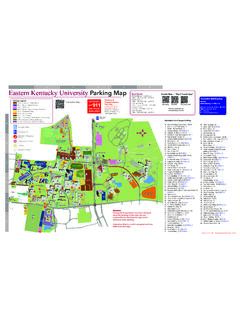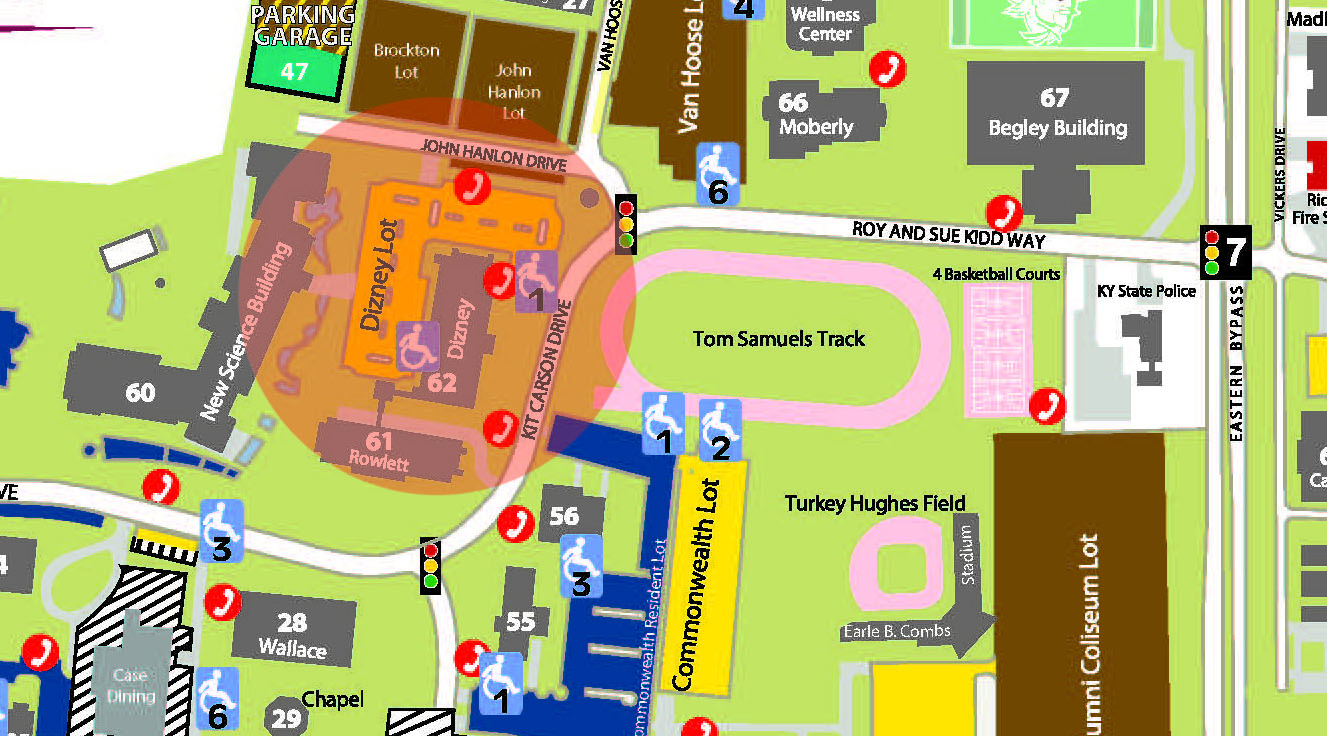Navigating the Campus: A Guide to Eastern Kentucky University’s Parking System
Related Articles: Navigating the Campus: A Guide to Eastern Kentucky University’s Parking System
Introduction
In this auspicious occasion, we are delighted to delve into the intriguing topic related to Navigating the Campus: A Guide to Eastern Kentucky University’s Parking System. Let’s weave interesting information and offer fresh perspectives to the readers.
Table of Content
Navigating the Campus: A Guide to Eastern Kentucky University’s Parking System

Eastern Kentucky University (EKU) boasts a vibrant campus environment, but navigating its sprawling grounds can be a challenge, especially for newcomers. The university’s parking system, however, is designed to streamline the process and ensure convenient access for students, faculty, and visitors. Understanding the intricacies of EKU’s parking map is crucial for a smooth and efficient experience.
Understanding the Parking Zones
EKU’s parking map is divided into distinct zones, each with its designated parking privileges. These zones are categorized based on their proximity to specific buildings, departments, and activities.
- Zone A (Central Campus): This zone is the heart of the university, encompassing the majority of academic buildings, administrative offices, and the student center. Parking in Zone A is generally reserved for faculty, staff, and students with specific permits.
- Zone B (Residential Areas): This zone houses the university’s residence halls and associated facilities. Parking in Zone B is primarily reserved for students residing in these halls, with limited access for visitors.
- Zone C (Athletics and Recreation): This zone encompasses athletic fields, recreation facilities, and the university’s stadium. Parking in Zone C is generally available for sporting events and recreational activities, with designated spaces for specific groups.
- Zone D (Peripheral Areas): This zone encompasses the outskirts of campus, including parking lots adjacent to specific departments, research facilities, and university-owned properties. Parking in Zone D is typically available for faculty, staff, and visitors with specific permits or event-related access.
Navigating the Parking Map
EKU’s parking map is readily available online and in printed format at various locations across campus. The map provides a visual representation of the different zones, parking lot designations, and access points. Understanding the map’s key elements is crucial for efficient parking:
- Zone Identifiers: Each zone is clearly marked on the map with a distinct letter and color code.
- Lot Numbers: Each parking lot within a zone is assigned a unique number for easy identification.
- Parking Restrictions: The map indicates specific parking restrictions within each lot, such as reserved spaces, permit requirements, and time limits.
- Access Points: The map highlights entry and exit points for each parking lot, enabling drivers to navigate the campus efficiently.
Parking Permits and Regulations
EKU’s parking system utilizes a permit-based system to regulate parking access. Students, faculty, and staff are required to obtain the appropriate parking permit based on their affiliation and needs.
- Student Parking Permits: Students are eligible for various parking permits, including residential permits, commuter permits, and disability permits, depending on their residency status and vehicle requirements.
- Faculty and Staff Parking Permits: Faculty and staff are eligible for parking permits based on their departmental affiliation and job responsibilities.
- Visitor Parking: Visitors are required to obtain a temporary parking permit at designated locations on campus, typically available for a limited duration.
Important Parking Considerations
- Parking Enforcement: EKU employs a parking enforcement team that monitors compliance with parking regulations. Vehicles parked in violation of the rules may be subject to fines or ticketing.
- Accessible Parking: The university provides designated accessible parking spaces for individuals with disabilities. These spaces are clearly marked and require a valid disability permit.
- Special Events Parking: During special events, such as sporting events or concerts, parking arrangements may differ from standard regulations. It’s crucial to consult the parking map and event-specific information for guidance.
Frequently Asked Questions (FAQs) about EKU Parking
Q: Where can I find a parking map?
A: The EKU parking map is readily available online on the university’s website, as well as in printed format at various locations across campus, including the Welcome Center, the Student Center, and departmental offices.
Q: Do I need a parking permit to park on campus?
A: Yes, all vehicles parked on campus, including student, faculty, staff, and visitor vehicles, require a valid parking permit.
Q: How do I obtain a parking permit?
A: Parking permits can be obtained through the university’s Transportation Services department, either online or in person. The application process typically requires vehicle registration information and proof of affiliation with EKU.
Q: What are the different types of parking permits available?
A: EKU offers a variety of parking permits, including residential, commuter, disability, faculty/staff, and visitor permits. The specific types of permits available and their associated fees may vary depending on the applicant’s affiliation and vehicle requirements.
Q: Where can I park if I am a visitor?
A: Visitors can park in designated visitor parking lots, which are typically located near the university’s main entrance and other prominent locations. Visitors are required to obtain a temporary parking permit at designated locations on campus.
Q: What happens if I park without a permit or violate parking regulations?
A: Vehicles parked without a valid permit or in violation of parking regulations may be subject to fines, ticketing, or even towing.
Q: Are there accessible parking spaces on campus?
A: Yes, EKU provides designated accessible parking spaces in all parking lots for individuals with disabilities. These spaces are clearly marked and require a valid disability permit.
Q: What are the parking regulations for special events?
A: During special events, such as sporting events or concerts, parking arrangements may differ from standard regulations. It’s crucial to consult the parking map and event-specific information for guidance.
Tips for Efficient Parking at EKU
- Plan Ahead: Before arriving on campus, familiarize yourself with the parking map and locate the designated parking zone for your destination.
- Arrive Early: During peak hours, parking spaces can fill up quickly. Arriving early can ensure you find a convenient spot.
- Consider Alternative Transportation: If possible, explore alternative transportation options, such as public transportation, cycling, or walking, to reduce parking stress and contribute to a sustainable campus environment.
- Be Aware of Parking Restrictions: Pay attention to parking signs and regulations, including reserved spaces, permit requirements, and time limits.
- Use Technology: Utilize the university’s online parking map and mobile applications for real-time parking availability and navigation assistance.
Conclusion
Navigating EKU’s parking system requires a clear understanding of the campus’s parking map and associated regulations. By familiarizing yourself with the different zones, parking lot designations, and permit requirements, you can ensure a smooth and efficient parking experience. The university’s parking system is designed to provide convenient access for all members of the EKU community, while maintaining a safe and organized campus environment. By adhering to the parking regulations and utilizing the available resources, you can contribute to the overall efficiency and harmony of EKU’s parking system.








Closure
Thus, we hope this article has provided valuable insights into Navigating the Campus: A Guide to Eastern Kentucky University’s Parking System. We hope you find this article informative and beneficial. See you in our next article!